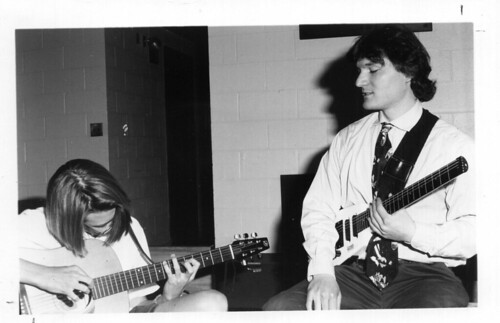 |
 image by EaglebrookSchool image by EaglebrookSchool |
Find the right music teacher for your child, and you're on the road to developing a talent along with a lifelong love of music. Find the wrong teacher, and you're not only looking at wasted time and money, but your child's perception that they aren't musical, an idea that falsely follows many into adulthood. So, before you schedule the lady two doors down or the cheapest teacher at the music store, consider these questions.
What are your goals?
- Are you hoping your child will discover and pursue developing a talent?
- Does your child have a gift for music along with an interest they are likely to pursue long-term?
- Are you hoping to delve deeply into one style of music or to study many styles?
- Are you hoping to master sight reading? Understand theory? Learn the stylistic differences between compositional periods?
- Does your child have a strong interest in music lessons?
- Do you need a teacher who will help to convince your child that lessons are worthwhile?
- Does your child have time to practice?
- Do you have time to help your child practice?
 |
 image by woodleywonderworks image by woodleywonderworks |
- Does the teacher involve parents in motivating students? Do they regularly communicate with parents regarding assignments and the progress?
- Are performance opportunities available? (Nothing motivates like having to play in front of people.)
- How do they measure progress?
- Will there be several missed lessons while the teacher is out of town performing, lecturing, etc.? (Beginning students really need consistent weekly lessons to progress.)
How have the teacher's musical experiences influenced their teaching philosophy? This discussion gives you a chance to ask about education, performing, and teaching experience. What makes this teacher want to teach? You want a teacher whose philosophy matches your goals, and who continues to give real thought to teaching methods. Their teaching philosophy should also indicate the way they prioritize teaching. Is performing the most important thing? Do they want to see students become musically literate ASAP? Do they believe teaching theory is important? What about music history? Do they firmly believe in the value of classical music? At what point do they introduce other genres?
How does the teacher select music for study? Do they teach a specific method? Some teachers specialize in a specific method, while others are more eclectic in their approach. Teaching consistently from a single method book might raise red flags that the teacher uses a one-size-fits-all approach to his/her students, or that the teacher doesn't pursue their own professional development through exploring new methods.
What are the teacher's expectations and how are they expressed? Do they ask for a specific amount of practice time, or are they more interested in the completion of assignments? What are the consequences of failing to meet expectations? How high are the standards set for their students? Do they write specific instructions on how to practice in a notebook or do they just circle the page of the piece to practice?
Does the teacher have a written studio policy? This should cover such topics as fees, makeup lessons, holidays, music purchases, and other logistics. No written policy can result in strained relationships when expectations are not clearly expressed and met. Ask for a copy of the policy, and review it with the teacher.
There are many ways to pick a teacher. Some people are impressed by resumes, professional affiliations, and teachers who charge high rates. These are often, but not always indications of a good teacher. Remember, you want to find the teacher who is right for you, so be honest and open in your discussion. You probably have more options than you realize.

That's really awesome blog because i found there lot of valuable Information. as we provide Instrument store near me at affordable prices. for more info visit our website.
ReplyDelete